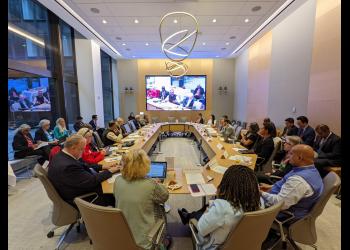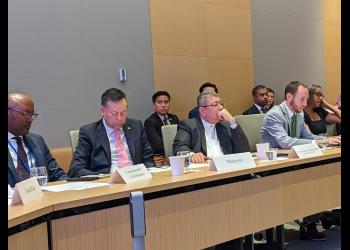Ambassadors & Civil Society ‘Flip the Script’ at BIC Event Exploring Participation in the Multilateral System
An event hosted by the Baha’i International Community (BIC) recently—on the subject of participation and representation at the multilateral level—sought to explore participation both in concept and in format and structure.
Setting aside standard United Nations (UN) protocol that prioritizes Member State participation, the event—with the agreement of all involved—began by welcoming a wide range of civil society actors to present concrete proposals for increasing civil society participation and representation in UN processes, followed by representatives of UN Missions responding to those suggestions.
The result was an action-oriented discussion that ranged from proposals as specific as establishing a United Nations Parliamentary Assembly and a UN advisory board of local and regional governments, to underlying concepts as wide as accountability, subsidiarity, legitimacy, and consensus.
“Putting people at the center means putting them at the core of the system design,” said panelist Maithili Pai, Programme Officer at the International Service for Human Rights. “This would mean redesigning the system. It would need visionary and expert architects to bring that design to life and to create a new infrastructure.”
The event, entitled “Participation and Representation: Better Connecting ‘We the Peoples’ to the Multilateral System”, was the fourth of an ongoing discussion series related to the Secretary-General’s Our Common Agenda report. It was organized by the BIC in collaboration with civil society organizations CIVICUS, Coalition for the UN We Need, and Democracy Without Borders.
“Multilateralism can only work if the people of the world believe in it and are able to engage with it,” said BIC Representative Daniel Perell in opening remarks. He noted that increased participation will require adjustments to current systems, as well as brand new ideas called for by this moment in human history.
Proposals offered at the event included the establishment of a civil society focal point in the UN system, paired with periodic focal point reviews and civil society inclusion audits. Steps suggested to Member States as ways to increase access to the UN included forgoing participation in spaces that lack adequate civil society representation and addressing the problem of reprisals against civil society actors who participate at the UN. Also mentioned were hybrid and online modalities to increase accessibility and implementation of the Secretary-General’s proposed annual civil society caucus.
Central to much of the discussion was a vision of relations between Member States and civil society actors that is based on collaboration, rather than opposition. “What we’re challenging here is not governments’ rights to negotiate and decide treaties, conventions, and resolutions,” said Ambassador Martin Bille Hermann of Denmark. “But those intergovernmental discussions and negotiations – and ultimately decisions - would be enriched by perspectives and inputs from civil society and other relevant stakeholders.”
Ambassador Maritza Chan-Valverde of Costa Rica noted the importance of outward-facing solidarity—and the challenges that arise when structures encourage individuals to identify by a single identity category and advocate primarily on behalf of its members.
“It tends to consolidate domains, rather than creating linkages across domains,” Ms. Chan-Valverde said. “To respond to this challenge, let’s encourage events characterized by people deliberately advocating for … other groupings, not only their own initiatives.”
Exploring the topic of meaningful participation, Adam Day, Head of Office of the United Nations University Centre for Policy Research, probed thinking around the commonly-voiced desire for a ‘seat at the table.’
“What if we question that metaphor?” Mr. Day asked, adding “instead … we think about how you distribute decision-making across entities, spaces, and people.”
Dato' Sri Saifuddin Abdullah, Foreign Minister of Malaysia, stressed the need for prompt and practical action, including the establishment of structures that might not be formally recognized at the outset. “While we are waiting for developments at the UN, we need to start acting on our own,” he said.
The compatibility of legitimacy and efficiency was stressed by María Fernanda Espinosa, member of the Global Women Leaders: Voices for Change and Inclusion. “For greater efficiency, we need legitimacy,” Ms. Espinosa said. “And the only way to build legitimacy in decision-making processes of the United Nations and the multilateral system, is to bring in ‘we the peoples.’”
Multiple speakers highlighted the need for global coordination in responding to global challenges. “For the future multilateral system…we need to look at issues not from border boundaries and nation boundaries, but from planetary boundaries,” urged Emilia Saiz, Secretary-General of United Cities and Local Governments. “In order to do that, we need all of us involved.”
Summary notes from the gathering can be found here. The Our Common Agenda series hosts discussion events on a roughly monthly basis. Upcoming themes include aspects of United Nations administration and outcomes of the recent Transforming Education Summit.



